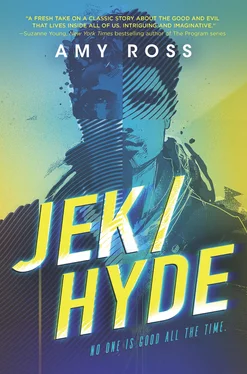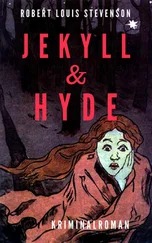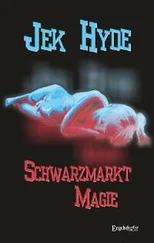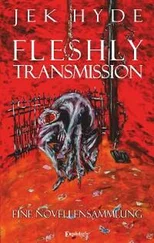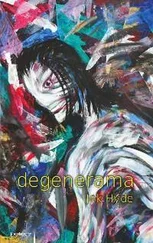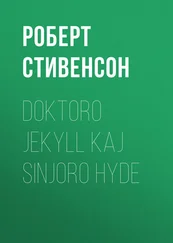My lab partner, Danny Carew, claimed he can’t find his goggles and is wandering the room asking people if they’ve seen them, which is a transparent excuse to curry votes for the upcoming student council election. He’s left me to do all the grunt work of setting up, which I’m not really doing because I’m distracted by Steve’s question. I’m itching to answer him, but he and his partner, Mark Cheong, are across the lab bench from me, very clearly not including me in their conversation.
“What do you mean, who is he?” replies Mark lazily. “He’s the guy who wins all these awards.”
“Yes, I know,” says Steve sarcastically. “This time for research into—” he reads from the screen “—metabolic pathways for the artificial synthesis of (S)-reticuline.”
Mark raises his eyebrows. “Impressive.”
Steve dismisses this assessment with a wave of his hand. “Sure, whatever. But who is he? If he’s good enough to win the Gene-ius Award, how come he’s not in any of my classes? I’ve asked around before, and no one seems to know him. Does he even go here?”
Steve’s got a big mouth and loves to act like he’s a real player in the school’s science competitions, but it’s mostly hot air. He placed once as a sophomore, but that’s it. Truth is, he isn’t half as smart as he thinks, and he spends more time obsessing over what everyone else is working on than studying and developing his own ideas. I don’t know how many times I’ve seen him in class with his head bent over in deep concentration, only to realize that instead of taking notes, he’s recalculating his GPA in the margins of his notebook.
Mark shrugs. “It’s probably some awkward loser you never even notice. Keeps to himself, you know? A silent, nerdy ghost, haunting the halls of London High,” he finishes in a fake-spooky tone.
I can’t ignore them anymore.
“He’s not a ghost,” I say, my eyes fixed on my notebook.
I can feel their stunned stares immediately. It clearly hasn’t occurred to them that I might know anything about this situation. This happens all the time. I’ve been in classes with these kids for years now, but they still act surprised when they realize I’m in the science track with them. As far as they’re concerned, the science track is for the London Chem brats—the ones whose parents work at the Research Park—not kids like me, the children of farm laborers. I’ve heard all the smooth comments about how great it is that London “supports diversity,” as if there’s no way I could have earned my spot in this class. Sure, biochem isn’t my best subject, but I’m at the top of my electrical engineering and information technology classes, if any of them cared to notice.
I clear my throat. “And you do know him. It’s Jek.”
Before I’ve even registered their reaction to this information, my body tenses up with guilt. I know very well what Jek would say if he heard me: that he doesn’t need or want me sticking up for him. Jek’s dealt with idiots like this his whole life and he’s figured out a way to handle them that works for him, which basically means letting these guys believe whatever the hell they want. It drives me nuts, but I’m beginning to understand that the alternative can be worse. But I just can’t stand the self-satisfied way these boys are so sure they know everything and deserve everything, and are blind to everyone who isn’t them.
After a moment’s silence, Steve lets out a sour laugh. “What are you even talking about?”
I look up from my lab notebook. “You know, Jek?” I nod toward Steve’s phone. “That’s his real name. Jayesh Emerson Kapoor. His initials are J.E.K.”
“The black kid?” says Mark, his tone incredulous.
I grip my pencil to steady my nerves, but I can feel my heart rate rising. Such an innocuous comment, but there’s so much behind it. I don’t know whether I’m angrier at the assumption that these two can read everyone’s race and ethnicity perfectly just from looking, or at their surprise that a black person could kick their ass at a science competition, but I can’t point out either one, since they didn’t actually say any of that.
“His mother’s Indian.” I keep my voice calm and steady. “His father is black.”
“Oh,” they say in tandem, as if that explains it all. “Indian.”
Let it go, Lulu. It’s not your fight. Jek can handle his own battles. Not that he does. He’s happy to fly below the radar and avoid drawing attention to himself. That kind of attention, anyway. It’s been this way since middle school, when he first abandoned his real name and told people—even teachers—to start calling him Jek. I asked him about it once, and he admitted that he was sick of people assuming he was nerdy and uncool because he was Indian. Presenting himself as the only black kid in our grade made him seem a lot more exciting—even if it came with other baggage, like people assuming he’s no good at science, or automatically blaming him whenever there’s any trouble.
Now, only his close friends know that he’s biracial, and that he’s secretly still obsessed with science. For everyone else, he just plays into their expectations: doesn’t advertise his grades, doesn’t talk much in class and when he gets called on, acts like he’s as surprised as anyone when he gets the right answers. And so he gets to be everyone’s cool friend instead of a threat. I wish he could find a way to embrace both sides of his identity and challenge people’s dumb stereotypes, but Jek’s made it clear he’s not interested in being a crusader.
“Does his mom work at London Chem?” Steve asks.
I nod.
He smacks his hand on the lab bench. “I should have known. The guy’s a ringer. His mom probably did the whole project for him.”
It’s the most absurd thing he could possibly say. If that’s his objection, it could be true for almost everyone in the science track at this school. If anything, Jek is the least guilty of this crime, given that his mom sometimes comes to him to consult on metabolic processes or different drug absorption mechanisms. I am this close, this close, to blowing up in this asshole’s face and telling him all about how Donnelly Pharmaceuticals has patents on three processes that Jek initially conceived in previous Gene-ius Award entries, but I’m saved by the return of Danny, who knows me well enough to read the dangerous expression on my face.
“Lulu,” he says gently. “Would you mind checking the storeroom for extra pipettes? If we wait till we reach that step, everyone else will have grabbed them all.”
I’m seething silently as I tug open the door to the supply room. I find the pipettes and grab a handful of them, still preoccupied enough to nearly mow down Maia Diaz on her way into the supply room. Somehow I manage not to drop glass everywhere, and I mumble an apology on my way out when she stops me with a light hand on my arm.
“Lulu,” she says softly when I turn around. “You’re friends with Jek, right?”
I raise my eyebrows, wondering why everyone is so interested in my best friend this morning. “Yeah.”
“Right,” she says, nodding to herself a little. “Can I ask you something?”
I shrug and gesture for her to go ahead. She glances around the room nervously, then grips my arm and tugs me back into the supply room. I’m so caught off guard that I don’t even try to resist. I know I should really get back to Danny, but I have to admit I’m curious about what Maia has to say.
She flicks on the light and pulls the door shut. In the shadowy depths of the supply closet, I see the wall of boxes behind her, all different sizes, and all identically marked with a leafy vine creeping through a double helix—the company logo of London Chem, and our sports team, the Helices. They look like the bewitched brambles of fairy tales, and for a strange moment they almost seem to be closing in on us. I nod for Maia to get on with it before claustrophobia gets to me.
Читать дальше
